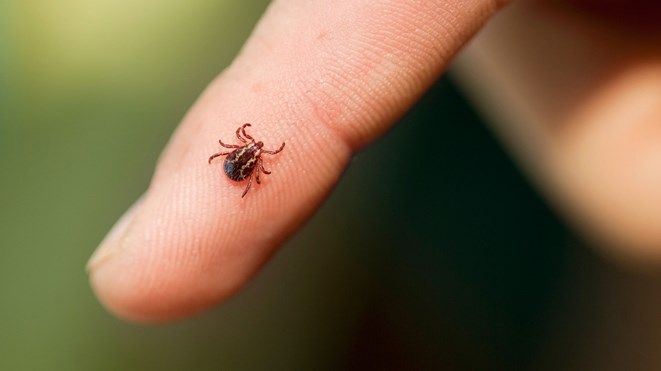A warning has been issued about a rare sickness called Powassan Virus after a nine-year-old boy became sick following a camping trip in Northern Ontario.
Powassan Virus can be passed to humans from the bite of a blacklegged tick, or the less common groundhog tick or squirrel tick, said Public Health Ontario. The virus was first discovered in Powassan, Ontario in the 1950s.
Most people who become infected are asymptomatic; however, infected individuals may show mild to severe symptoms such as fever, headache, nausea, vomiting, weakness or muscle and joint pain.
Severe disease may result in meningitis and/or encephalitis with symptoms that may include confusion, loss of coordination, difficulty speaking, paralysis, seizures or coma.
The latest edition of the Canadian Medical Association Journal (CMAJ.ca) features a case study report about the nine-year boy, otherwise healthy, who was presented at the emergency department of an Ontario hospital in July.
The child had a one-day history of fever, a stiff neck and headache.
This followed a camping trip he took the week previous in Northern Ontario.
There were no rashes. There were no gastrointestinal issues. Blood samples were taken and numerous tests followed. Although meningitis was suspected, it was not the case.
As numerous other suspected disorders were tested and ruled out, the boy's condition worsened. Lyme disease was also ruled out.
"On the third day of hospital admission, the patient was transferred to our tertiary care hospital’s pediatric intensive care unit, because his level of consciousness was deteriorating. On examination, he appeared unwell, with blood pressure 137/61 mm Hg, heart rate 41 beats/min, and temperature 38.3°C," said the report.
As tests continued, the boy continued to have a fever and headaches, said the report.
The doctors even sent serum arbovirus serology samples to the Ontario Public Health laboratory, but results would not come back until after the patient was discharged.
"Given concern for potential autoimmune encephalitis, the patient received intravenous immunoglobulin at a dosage of 1 g/kg for two days, with notable improvement in his level of consciousness within 24–48 hours," the report said.
"We discontinued antibiotics after a total of five days once bacterial cultures were found to be negative. The patient was subsequently transferred to the inpatient pediatric ward for 10 days for rehabilitation related to a persistent left-sided weakness," the report continued.
Within two months, the boy had recovered.
Also, it was after the patient's discharge that Public Health Ontario notified the doctors that serum antibodies to Powassan Virus were detected in the samples that had been sent to the provincial lab.
The CMAJ report also stated that increased awareness of Powassan Virus among clinicians in Canada will likely lead to increased identification of the virus and other arthropod-borne infections, which should always be reported to public health agencies.
Health Canada said the risk of acquiring Powassan Virus is much lower than the risk of acquiring Lyme disease. But people should still take precautions against tick bites when engaging in outdoor pursuits such as hiking, hunting, fishing, camping, walking the dog or even golfing.
The incubation period for Powassan Virus infection is about one to five weeks. Most patients experience flu-like symptoms lasting a few days; however, some patients will develop neuroinvasive disease presenting with symptoms characteristic of viral encephalitis, including fever, headache, and altered mental status, said the study
The case study report was authored by Zachary Blatman, Anne Rowan-Legg, Joshua K. Schaffzin, Nagwa Wilson and Nicole Bechard; physicians and researchers associated with Pediatric Medicine and Pediatric Infectious Diseases at the Children’s Hospital of Eastern Ontario.
The full text version of the report is available online here.
